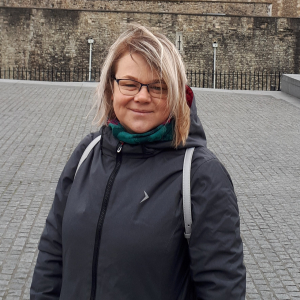German-Latvian LSP Glossary of Kawall’s ‘Dieva radījumi pasaulē’ and its Original Work
Silga Sviķe is a teacher, linguist and researcher focusing on special domain dictionaries. Her research visit will take her to the ACDH-CH where she aims to create a bilingual digital LSP corpus in order to translate specialized literature.
© Silga Sviķe, 2020
How did you learn about the ELEXIS travel grants?
I am following ELEXIS EU on Facebook and the postings about the open call for #travelgrants caught my attention.
Which hosting institution did you apply to?
I applied to the Austrian Centre for Digital Humanities and Cultural Heritage (Austrian Academy of Sciences) because the ACDH-CH can provide the expertise needed and has a strong background in the application of Digital Humanities (DH) methods.
Find out more about ELEXIS visiting grants and former winning projects:
I believe that practical lexicographic solutions can greatly improve the work of translators.
What is your project about?
My visiting grants project is part of a larger project aiming to investigate Latvian botanical terminology used in H. Kawall’s work “God’s Creatures in the World” (“Dieva radījumi pasaulē”). This work (a textbook) is one of the first translations of specialized literature from German into Latvian, in which the author mentions such Latvian botanical terms as augs (plant) and augu valsts (plant kingdom) for the first time ever – these terms are still used to the present day.
A detailed research of botanical lexis requires a digital corpus of language material in order to compare and study special lexis used in the original language and translation. Therefore, the plan is to compile a German-Latvian LSP glossary (Language for Specific Purposes) based on the work’s translation into Latvian and its original in German.
The bilingual glossary would include a collection of special botanical vocabulary used in H. Kawall’s translation and original work. The goal of my research stay is to create a bilingual digital LSP corpus based on the original book in German and its translation into Latvian, along with the aim to compile a bilingual LSP glossary.
The goal of my research stay at the ACDH-CH is to create a bilingual digital LSP corpus based on its German original and its translation into Latvian, along with the aim to compile a bilingual LSP glossary.
What is your background that brought you to this point?
In 2016, I received a PhD in Applied Linguistics from Liepaja University and Ventspils University of Applied Sciences (VUAS). Since February 2017, I have been a researcher at the Faculty of Translation Studies of VUAS, and my research interests are focused on principles and methods of developing special domain dictionaries. My research topics are related to lexicography and special terminology, especially botanical and legal terms, and the analysis of the methods of compiling dictionaries and practical lexicography. I am also teaching German as a Second Foreign Language, Terminology and Contract Translation Classes in the Bachelor Programme. I believe that practical lexicographic solutions can greatly improve the work of translators.
Where does your interest in languages/lexicography come from and what keeps you motivated?
I have been interested in lexicography for a long time: I am working as a translator, hence I am particularly interested in practical lexicography that enhances translation work. The great opportunities and potential of digital technology keep me motivated to undertake further research and I am very grateful to be able to carry out my project at the ACDH-CH.
Find out more:
| Profile: Silga Sviķe | ||
| Travel Grant | Call 3 | |
| Period of stay | 16.3. – 20.3.2019 | |
| Project title |
German-Latvian LSP Glossary of Kawall’s “Dieva radījumi pasaulē” and its Original Work |
|
| Home institution |
Ventspils University of Applied Sciences, Latvia |
#elexis_lv |
| Hosting institution | Austrian Centre for Digital Humanities and Cultural Heritage (ACDH-CH, Austria) |
#elexis_at |





